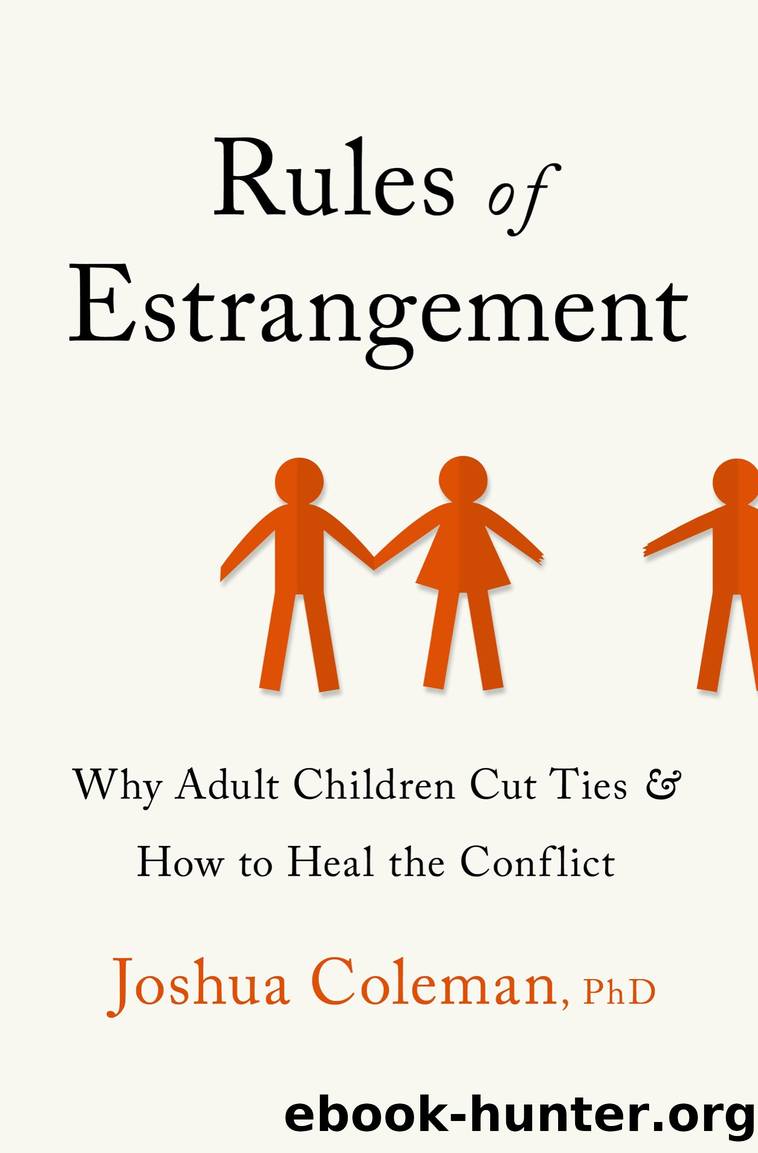Rules of Estrangement by Joshua Coleman PhD

Author:Joshua Coleman, PhD [Coleman, Joshua]
Language: eng
Format: epub
Publisher: Potter/Ten Speed/Harmony/Rodale
Published: 2021-03-02T00:00:00+00:00
ARE PARENTS TO BLAME IF THEIR GROWN SIBLINGS ARE ESTRANGED?
In my practice, I often meet individual clients who want to explore the ways they felt treated differently from their siblings and to understand how those differences affected their confidence or self-perception. Because siblings typically enjoy the longest family relationships, their ability to influence the otherâpositively or negativelyâover the course of their lives is significant. Studies show that differential treatmentâwhere parents behave more positively toward one of their childrenâcan affect the overall well-being of children even after theyâre grown and also increase their later risk for depression or lower self-esteem.
And yet sibling relationships are not influenced by parents as much as we believe. Brothers and sisters can engage in a range of behaviors that are well beyond the control or influence of parents by choosing friends, activities, or romantic partners that pull them in unpredictable directions. This is especially true for parents in poverty or who otherwise have limited means. These sibling differences can result in a later sibling estrangement despite being raised with psychologically sophisticated and conscientious parents. While there are an infinite number of things parents can do to worsen sibling relationships, there are often real limitations to what they can do to make them better.
Rather than a straightforward cause and effect, sibling relationships are constantly mediated through the ways that genetic predispositions interact with culture, neighborhood, online sources of influence, economic security or insecurity, and good or bad luck. Children who are oppositional, aggressive, overly reactive, unempatheticâor those with ADHD, learning disabilities, autistic spectrum disorders, even vulnerabilities to depression and anxietyâmay create obstacles for parents and siblings. And to complicate matters further, a child who is easy to parent (like Carla) may invite more envy, anger, even abuse from a sibling who is less winning or less temperamentally matched with the parent (like Sally).
Many parents, moms especially, feel theyâve failed their children if the siblings are estranged or distant from each other. Which is tragic because, if anything, todayâs parents have less influence than ever over the quality of their childrenâs relationships. As with marriage and relationships between parents and their adult children, very little bonds siblings to each other today beyond ties of affection. As family historian Steven Mintz notes, while siblings once competed over material resources, todayâs siblings compete over emotional resources, which are harder to quantify. âMom loved you bestâ is a more difficult thing to measure than âDad gave you a hundred acres and all I got was this lousy cow.â Misperceptions and hostilities can abound when love and attention are the aspects being measured.
While sibling conflict and antipathy may sometimes seem inevitable, it wasnât always the case in our nationâs history. In the early national period, Euro-American siblings often played a more critical supporting role in each otherâs lives. In African American, Native American, and Euro-American households, the relationships between siblings provided a much-needed counterbalance to inequalities around wealth, status, and power. Sibling loyalty and affection, rather than rivalry and conflict, were far more common prior to the twentieth century.
Download
This site does not store any files on its server. We only index and link to content provided by other sites. Please contact the content providers to delete copyright contents if any and email us, we'll remove relevant links or contents immediately.
Four Thousand Weeks by Oliver Burkeman(1853)
What Happened to You? by Oprah Winfrey(1767)
Karma by Sadhguru(1613)
This Changes Everything by Unknown(1509)
You Are a Badass: How to Stop Doubting Your Greatness and Start Living an Awesome Life by Jen Sincero(1186)
Don't Sweat the Small Stuff...and It's All Small Stuff by Richard Carlson(1121)
Infinite Circle by Bernie Glassman(1051)
How to Do the Work by Dr. Nicole LePera(1010)
Let's Talk About Hard Things by Anna Sale(994)
Declutter Your Mind: A step by step guide to learn to control your thoughts, stop worrying, relieve anxiety and eliminate panic attacks and negative thinking by Mia Chandler(968)
The 4-Hour Workweek by Timothy Ferris(959)
Who Moved My Cheese? by Spencer Johnson(959)
Real Strength: Build Your Resilience and Bounce Back From Anything by Psychologies Magazine(944)
The Path of Greatness--The Game of Life and How to Play It and Other Essential Works by Florence Scovel Shinn(928)
Breakup Bootcamp by Amy Chan(898)
Be Your Best Self by Mike Bayer(893)
Curative Magic by Rachel Patterson(886)
The Book of Hope by Jane Goodall(872)
Advice for Working Moms (HBR Working Parents Series) by unknow(868)
